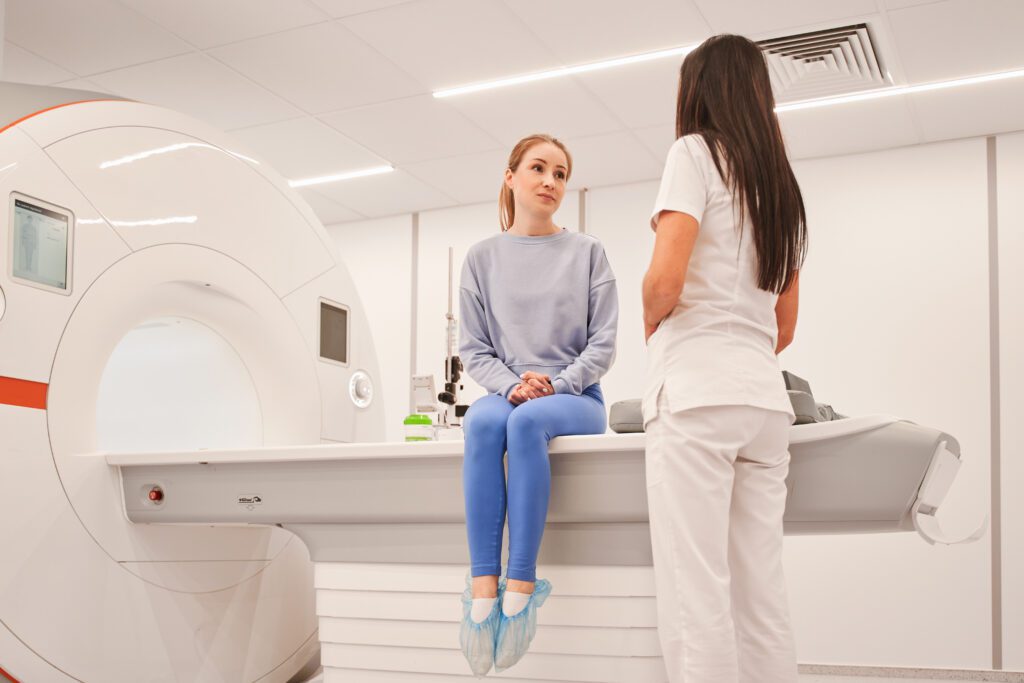An MRI scan is a valuable tool that your doctor uses to get a clearer picture of what’s happening inside your body. Your MRI results will give your doctor a lot of the important information they’ll need to understand what’s causing your symptoms.
If you’ve never had an MRI, you should know it’s a very common diagnostic scan that’s quick and non-invasive, offering your provider many highly accurate images to study.
We’ll show you everything you need to know about getting an MRI. Let’s find out why your doctor has recommended an MRI, and at what you can expect before, during, and after your MRI appointment.
Why your healthcare provider recommended an MRI scan
Your healthcare provider recommended an MRI because it offers detailed images of the tissues and structures inside your body, and your provider can study those results to better understand your condition.
By understanding what an MRI scan does and how it works, you can feel more prepared for the experience and see how it supports your provider in making an accurate diagnosis. Let’s explore how an MRI can help them help you.
What does an MRI scan do? How does it help my healthcare provider?
An MRI scan allows your doctor to get a detailed look inside your body, using magnetic fields and radio waves to produce highly detailed images. An MRI is particularly effective at showing soft tissues, like your muscles, blood vessels, nerves, and organs, in fine detail. This level of detail helps your doctor understand structures that might be contributing to your symptoms.
MRIs are often recommended when other exams, like physical assessments, don’t provide enough information to fully understand what might be causing your symptoms. The clear images produced by an MRI can reveal information about a wide range of conditions, from injuries to potential medical conditions that need closer examination.
How exactly does an MRI help my provider understand my condition?
An MRI scan creates images of your body that allow your doctor to carefully review areas they may have concerns about, or that are difficult to examine through other tests.
With these images, your doctor can look closely at structures and tissues in multiple views, which helps in identifying anything that looks unusual or out of place. This lets them see if there are any abnormalities, such as unusual swelling, changes in tissue structure, or signs of injury.
An MRI can show tissues and structures with clarity, which might be essential in cases where symptoms suggest a condition related to nerves, joints, or internal organs. This information can also help them decide whether further tests are needed, or if other parts of your body should be checked.
How does an MRI scan help my provider make a diagnosis?
An MRI scan creates detailed, cross-sectional images that your doctor can examine layer by layer, allowing them to see both the larger structures and the intricate details of tissues within the area being scanned. This depth and precision help in identifying anything unusual that could be contributing to your symptoms.
Each image from an MRI scan gives your doctor a unique perspective, allowing them to understand your body in a way that wouldn’t be possible otherwise. With this information, your doctor can pinpoint areas of concern, narrow down potential diagnoses, or even rule out certain conditions altogether.
How to prepare for your MRI scan
To get ready for an MRI, you’ll need to follow your healthcare provider’s instructions closely, and to dress properly for an MRI scan. These tips will help you get ready for your upcoming MRI. Let’s dive into what you need to know before your appointment.
How should I get ready for my MRI scan?
Be sure to follow your provider’s instructions for getting ready. You may be asked not to eat or drink anything for a few hours beforehand, especially if your scan requires a contrast dye, as this can help produce clearer images.
If you take medications, bring a list with you, as the MRI team might need to know about any prescriptions or supplements. Let your provider know about any metal implants, pacemakers, or other devices you may have, as any metal can interact with the MRI machine’s magnetic fields, creating inaccurate MRI results.
What should I wear to my MRI appointment? What should I avoid wearing?
Choosing the right outfit for your MRI scan can help things go smoothly and reduce any need to change. Comfortable, loose-fitting clothing without any metal components (like zippers, buttons, or hooks) is a good idea. Avoid wearing jewelry, watches, or accessories with metal, as these items can interfere with the MRI machine.
What if I feel anxious before my MRI scan? How can my MRI technologist help?
It’s completely normal to feel a little nervous before an MRI, especially if this is your first one. If you’re feeling anxious, let your MRI technologist know; they are there to make the experience as comfortable as possible. They can explain the steps involved, and answer any questions you might have.
You can communicate with the technologist during the scan, if you need to, using an intercom inside the MRI scanner. You might also be offered earplugs or headphones, as the MRI machine can be loud, and some centers offer calming music to help you relax. We want to make sure you have a great experience.

What to expect during your MRI appointment
During your MRI scan, you’ll work with a technologist who is there to assist you, and to guide you through every step of your MRI. You’ll have their support the entire time. Let’s walk through what you can expect, so you’ll be ready for your scan.
What does an MRI machine look like? Do I have to go all the way inside the scanner?
An MRI machine is a large, tube-like structure with a flat, cushioned bed that slides in and out of the scanner. You’ll be asked to lie on this bed, which moves slowly into the machine.
For most MRI scans, you’ll be placed in the center of the machine to get clear images, but depending on what part of your body is being scanned, you might not need to go fully inside. The technologist will make sure you’re as comfortable as possible before positioning you.
If you’re feeling anxious about being inside the machine, you should know that the tube-shaped machine is open at both ends, and the technologist can see and hear you the whole time. The machine can feel snug, especially around your shoulders and arms, but the team will do everything they can to make sure you’re comfortable.
For those who are especially claustrophobic, there may even be options like open MRI machines that don’t enclose you fully, though these might vary by facility.
What happens during an MRI scan? How long does it usually take?
Once you’re positioned inside the machine, your MRI scan will begin, and the machine will start taking detailed images. You’ll hear a series of loud, rhythmic thumping sounds as the machine captures these images—this is completely normal. You’ll likely be given earplugs or headphones to reduce the noise, and some centers will play music for you.
MRI scans usually take between 15 and 90 minutes, depending on your circumstances, and the level of detail your doctor needs. During your scan, it’s important to remain still, as any movement can blur the images.
What if I feel uncomfortable, or if I need to speak with my technologist?
You’ll be in touch with your technologist throughout the scan, using the MRI machine’s built-in intercom, so you can communicate with the technologist if you need assistance or reassurance.
If at any point you feel uncomfortable, simply let them know, and they can pause the scan to help you. Don’t hesitate to speak up: your technologist is trained to help people like you, who are getting an MRI for the first time.
What happens after your MRI scan
After your MRI scan is complete, all you have to do is wait for the results. We will let you know how long it takes to get your results, and how you can discuss your results with your healthcare provider.
What happens following an MRI scan? Can I go back to normal activities?
Be sure to follow your provider’s instructions. You can plan to return to normal activities immediately after your MRI, including driving or resuming work, unless your provider has given you specific instructions to follow.
If you received a contrast dye for the scan, you might be asked to drink extra water to help your body process it, but no other aftercare is necessary. Most people feel fine following an MRI, but if you have any unusual feelings or discomfort after the scan, be sure to let your provider know.
How long will it take for me to get my MRI results?
It will take about a week to get your results. Your MRI images will be reviewed by a radiologist, who is a board certified specialist trained in interpreting medical images. This process usually takes several days, as the radiologist will carefully examine each image, and compile a report to share with your healthcare provider.
Once your provider receives the radiologist’s report, they’ll reach out to you about your MRI results. If you haven’t heard back within a week or so, don’t hesitate to reach out to your provider’s office to check on the status.
What are some important things to discuss with my provider about my results?
When your provider goes over your MRI results, you should ask questions to make sure you fully understand your results. Start by asking about the overall findings and whether they provide insight into your current symptoms.
Ask your provider if there are specific steps or treatments they recommend, based on the MRI results, and if any lifestyle changes could help with your symptoms. Be sure to clarify anything that isn’t clear to you, as understanding your results can empower you to make informed choices about your healthcare.
How to schedule your MRI appointment with us
Touchstone Medical Imaging offers MRI scans in Arkansas, Colorado, Florida, Montana, Oklahoma, and Texas.
Reach out to us at Touchstone, and we’ll help you schedule an MRI appointment at an imaging center near you, today.
We’re here to help you get the answers you need.

Frequently Asked Questions (FAQ)
A: Your provider may suggest an MRI to capture detailed images of internal tissues and structures to help diagnose your symptoms.
A: MRI scans display detailed images of soft tissues like muscles, nerves, and organs, providing essential insights for your provider.
A: Follow your provider’s instructions, which may include fasting if contrast dye is needed, and avoid wearing metal items.
A: Wear comfortable, loose-fitting clothing without metal components, and we recommend leaving jewelry or accessories at home so you don’t have to worry about removal.
A: Let the MRI technologist know, as they can offer earplugs, and do everything they can do to help you relax.
A: Depending on the area being scanned, you may enter the machine fully or partially.
A: MRI scans usually last between 15 and 90 minutes, depending on the specific images your doctor needs, and the area of the body being scanned.
A: It typically takes about a week to receive your results, as a radiologist reviews the images, and it takes time for your provider to review the radiologist’s report.

